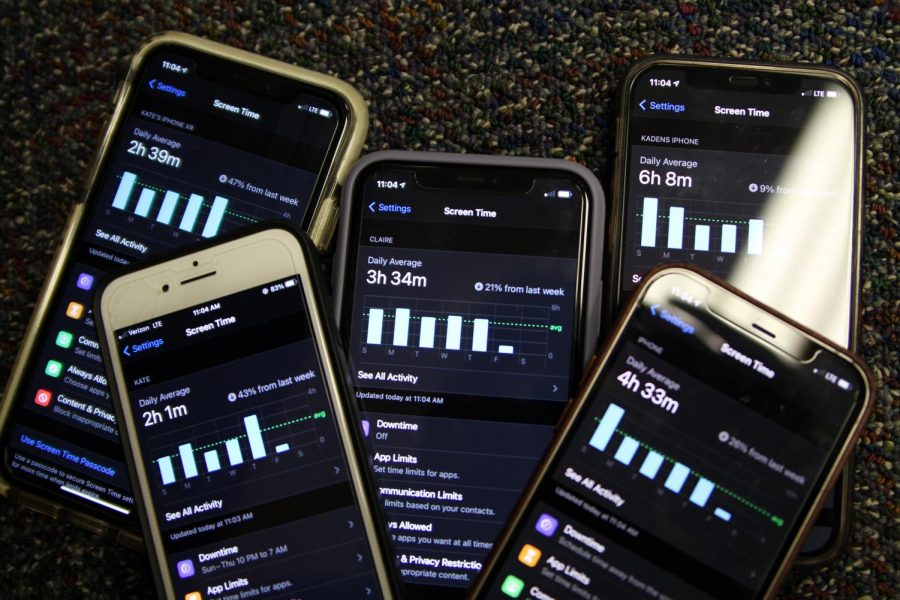‘The Social Dilemma’ that needs to be addressed
High screen time is an issue for many people, illustrated in “The Social Dilemma.”
October 30, 2020
The countless negative effects that social media has on our health is common knowledge, yet we all continue to endlessly scroll. Jeff Orlowski’s latest hit documentary, “The Social Dilemma,” dives into the specifics of how our phones are harming us, and it even inspired me to take a week-long cleanse of my own.
Although the film was initially released on Jan. 26, 2020, the Netflix sensation has become a recent phenomenon over the last couple of months. It explores both the psychological and moral issues implanted in common media platforms by interviewing former high-ranking executives of companies like Facebook, Google, Twitter, Pinterest and others. This might seem like a repetitive concept, but “The Social Dilemma” is not just another “Karen” telling people to spend less time on their screens. The film takes the conversation a step further by showing every-day people, who are largely suffering from the media’s effects. Some scenes include an isolated family dinner, a teenage girl struggling with self-image and a political protest that turns violent.
“The Social Dilemma” uses the actors and experts to explain how these huge enterprises prey on vulnerable social media users, manipulating them into giving up their time. At the end of the day it all comes down to making a profit, and media companies have gotten pretty creative in their methods. A late Telefonica study found that the average smartphone user receives 63.5 notifications a day, all of them enticing you to spend more and more unnecessary time on your phone. The film also reveals the shocking exponential growth rates of depression, anxiety, self-harm and even suicide since the start of this new media age. “The Social Dilemma” cites the CDC in showing that hospital admissions for self-harm in preteen girls are up 189% since 2009 and suicides up 150% compared to the 2000-2010 average.
Another alarming topic the documentary details is the vast increase in political polarization due to these growing platforms. Algorithms that track our every digital move alter our search engines, making what we see more and more radical each time we hit “enter” — not to mention the widespread fabrications that pop up on our screens daily. According to “The Social Dilemma”, fake news spreads six times faster than real news. This formula has sparked more political isolation than ever, quickly diminishing our ability to respect and appreciate others’ opposing beliefs.
As for my social media cleanse, I deleted Twitter, Instagram, Snapchat and VSCO for one week to see what effect it would have on me. Keep in mind I was in quarantine, so this task seemed especially daunting given that social media was my only connection to the outside world. For the first couple of days I noticed myself tapping the screen where my apps used to be. After I got over the initial loss of my beloved profiles, I grew to like not feeling the pressure of scrolling until I got to the “You’re all caught up” Instagram message, or clicking through everyone’s Friday night plans while I was stuck at home.
However, my cleanse did eventually come to an end and while I was excited to see what I missed, a part of me wished it could last forever. I thought, why not have the best of both worlds? I decided to keep my apps, but set screen time and downtime limits for myself as well as turning off notifications for Twitter and Instagram. Now that I’ve lived with my new habits for awhile now, I can happily report that I have noticed a significant decline in my usage. I went from an average screen time of 3 hours and twenty-seven minutes per day prior to my cleanse to now averaging 2 hours and sixteen minutes per day.
In reality, social media is not ruining our lives and has many redeeming qualities, but it definitely plays a negative role in our overall well-being. My advice is to be aware of your screen time and put down your phone if you notice it negatively impacting your emotions or real communication. Also, know that it’s okay to take a break when you find everything overwhelming… let’s abnormalize spending hours on our phones, start paying attention to what they’re doing to us and figure out what we can do to stop them.









